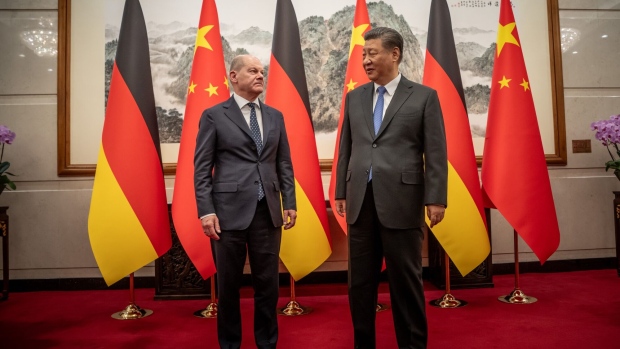Apr 15, 2024
Scholz Says He Will Raise Trade Rules, Ukraine in Talks With Xi
, Bloomberg News

(Bloomberg) -- Chinese leader Xi Jinping told the German chancellor that a surge in clean-technology exports from the Asian nation has helped the world tackle inflation, pushing back against European and US pressure to rein in the country’s powerhouse industries.
Xi’s comments to Olaf Scholz during talks Tuesday in Beijing suggest China may not be swayed in any meaningful way by the German leader’s push for a reduction in what Western officials see as excess manufacturing capacity.
Tensions between China and the European Union and US are mounting over trade, leading to threats of new barriers to hundreds of billions of dollars in commerce. The EU has launched probes into Chinese subsidies for electric vehicles and support for windparks, and is poised to begin an inquiry into the procurement of medical devices.
Read More: EU Goes on China Trade Offensive After Getting ‘Played’
“China’s export of electric vehicles, lithium batteries and solar products have enriched supplies to the global market and eased inflationary pressure, as well as made a great contribution for global efforts to tackle climate change and green transition,” Xi told Scholz, according to Chinese state television.
He said China and Germany should look at the question “objectively” and address it from a market perspective. He also warned against protectionism.
Scholz is on the final leg of his four-day trip to his nation’s main trading partner, his second visit to China as chancellor. He also held talks with Chinese Premier Li Qiang on Tuesday, having earlier warned Chinese officials to address overcapacity and treat foreign firms more equitably.
At the start of their meeting, Scholz told Li that German companies want to increase investments in China but better framework conditions are needed.
“With this we mean equal market access and fair conditions for competition, the protection of intellectual property and a reliable judicial system,” he told his Chinese counterpart. “We want to work on concrete improvements on those areas.”
Li pushed back against the notion that China has skewed the market in favor of its companies unfairly and argued that state support is compliant with WTO rules.
“Industrial subsidies are a common practice in the world, and many countries have much more subsidies than China,” he said, according to an official German government transcript of his remarks. “Adequate overcapacity serves to ensure full competition and the survival of the fittest.”
Bloomberg New Energy Finance estimated in a March report that Chinese companies will invest $469 billion in producing surplus clean energy equipment over the next three years. Chinese production of batteries and solar panels is set to be double global demand over the next two to three years, BNEF said.
The has US brought a series of trade cases against China for dumping solar panels that Washington says benefit from unfair subsidies.
Earlier, during an appearance with Xi, Scholz asserted that “both China and Germany are trading nations that benefit greatly” from membership in the World Trade Organization.
“We are committed to strengthening the rules for global trade and developing them further together with the other WTO members,” he added.
US Treasury Secretary Janet Yellen said on a visit to China this month that the vast output of China’s factories had become a global problem. The US won’t take “anything off the table,” including the possibility of additional tariffs, to stem the flood of Chinese goods, she told CNN over the weekend.
Beijing has dismissed charges that the rapid growth of its EV industry was due to government subsidies as “groundless,” instead pointing to its innovation prowess.
Read More: EU Set to Launch China Probe on Medical Device Procurement
While Scholz has been careful to stay on good terms with his hosts, he has been more assertive about his nation’s worries than his predecessor, Angela Merkel, who prioritized business interests.
Scholz told an audience of university students on Monday in Shanghai that “competition must be fair.” He added that he would like to see “no dumping” and “no overproduction,” and that copyrights should be respected.
The criticisms aimed at China come as Xi leans on his nation’s massive manufacturing industry to reinvigorate economic growth that has faced headwinds from an unfolding property crisis, deflationary pressures and lackluster consumer demand.
China reported data on Tuesday that showed economic growth beat expectations in the first quarter as the industrial sector powered forward, although a tail-off in March activity signaled more support may be needed to sustain that momentum.
During a discussion about Russia’s war on Ukraine, Xi reiterated China’s established position to Scholz.
According to a report by state news agency Xinhua, he emphasized that “in order to prevent the conflict from spiraling out of control, all parties should work together to restore peace as soon as possible.”
Xi also told Scholz that all nations should sit at the negotiating table and no country should be “on the menu” of any other, according to a person familiar with the discussion.
The German delegation viewed this as a sign that China is taking Europe’s concerns over Russia’s war against Ukraine seriously, said the person, who asked not to be identified discussing confidential talks.
Xi earlier touted the importance of China-Germany ties as the world faces “increasingly more challenges and risks.” He said the two nations should “join hands to inject more certainties” internationally.
--With assistance from Ben Holland, Jing Li, Iain Rogers, Tom Hancock and Simon Casey.
(Updates with comments from Chinese premier in 10th paragraph)
©2024 Bloomberg L.P.







